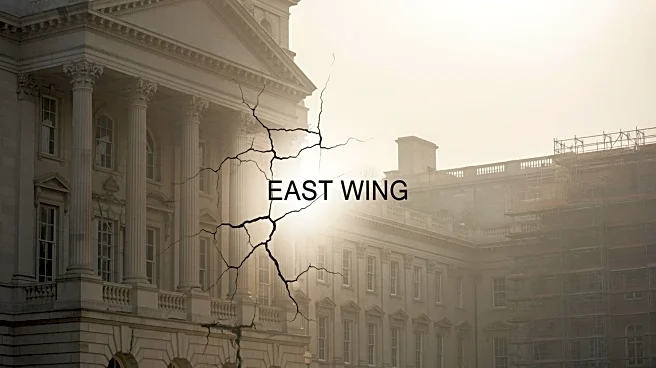What's Happening?
The Trump administration is moving forward with the demolition of the East Wing of the White House to make way for a new 90,000 square foot ballroom. This decision has sparked concern among preservationists, including the National Trust for Historic Preservation,
which has called for a pause until the plans undergo legally required public review processes. Despite these calls, the demolition is ahead of schedule, with the White House insisting that the project is necessary for modernizing and enhancing the structure. The demolition includes tearing down the East Garden Room, Family Theater, and East Colonnade, as well as office complexes. The project, initially estimated to cost $200 million, has now ballooned to $300 million, funded by private donors.
Why It's Important?
The demolition of the East Wing and the construction of a new ballroom have significant implications for the historical integrity of the White House. Preservationists argue that the new construction could overwhelm the classical design of the White House and disrupt its architectural balance. The project also raises questions about the role of public review processes in federal construction projects, as the White House has not yet submitted plans to the National Capital Planning Commission. The funding of the project by private donors, including major corporations, highlights the intersection of private interests and public heritage, potentially setting a precedent for future renovations of national landmarks.
What's Next?
The White House plans to seek approval from the National Capital Planning Commission before the construction phase begins, although no timeline has been provided for submitting the plans. The commission, currently closed due to a government shutdown, will review the plans once submitted. The project has secured $200 million in donations from various private entities, including Amazon, Google, and Lockheed Martin. The completion of the ballroom is expected to provide a modern space for state dinners and large gatherings, addressing a long-standing complaint by President Trump about the lack of appropriate venues within the White House.
Beyond the Headlines
The demolition and construction project at the White House raises broader questions about the preservation of historical sites and the influence of private funding on public projects. The involvement of major corporations as donors may lead to discussions about the ethical implications of private entities funding renovations of national landmarks. Additionally, the project could trigger debates about the balance between modernization and preservation, as well as the transparency and accountability of federal construction projects.















